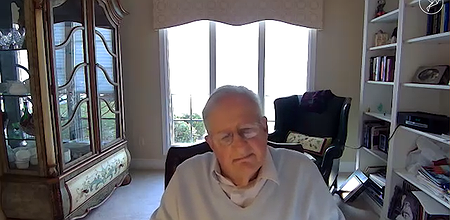- Analyze the concept of compassion fatigue and establish how it relates to secondary trauma and burnout
- Assess the factors that can contribute to compassion fatigue
- Investigate the role of autonomic nervous system reactions in compassion fatigue
- Employ evidence-based strategies from mindfulness and mental health treatments to reduce stress and increase well-being
A Guide to Overcoming Compassion Fatigue with Compassion Resilience
Dr. Debra Alvis, Psychologist
Polyvagal-informed strategies to revitalize your empathy and foster resilience
Excerpt:
- 5h of continuing education
- 33 lessons that last from 5 to 15 minutes each
- 1 certificate of achievement
- 1 PowerPoint
- 1 bibliography
- 1 course evaluation
- 7-day money back guarantee
- Unlimited access
- 97% of participants who completed the satisfaction survey declare they would recommend this course to a colleague
Overview
Compassion is a vital aspect of the work done by healthcare providers, teachers, and parents. However, excessive demands on our capacity for empathy—whether our own or that of our patients—can leave us feeling drained, overwhelmed by others’ suffering, and dreading the next day of work. This experience, known as compassion fatigue, often leads to feeling overworked, which adversely affects not only those we serve but also our personal well-being, relationships, and careers. Over time, the constant strain of stress or trauma can push our nervous systems into overdrive, making it challenging to revert to a balanced state.
A Polyvagal-informed approach offers a pathway to recover from compassion fatigue and build nervous system resilience. As our resilience grows, we recover from stressors more quickly and experience them with less intensity. In this workshop, Dr. Debra Alvis will introduce strategies to cultivate greater compassion resilience and enhance nervous system flexibility. Participants will examine the factors contributing to compassion fatigue and learn how it relates to trauma and burnout. Dr. Alvis will also clarify the role of the autonomic nervous system in the development of compassion fatigue and explain how vagal states and associated behaviors can be assessed.
By the end of this workshop, you will be equipped with Polyvagal-informed techniques—drawn from mindfulness and other mental health treatments—that strengthen the nervous system’s capacity to cope with stress. You will also receive practical tools to help both you and your patients regain a sense of purpose and fulfillment. These take-home resources are designed to alleviate the exhaustion of compassion fatigue and, just as importantly, to proactively prevent it.
Accreditation
Collège des médecins du Québec
For physicians who practice psychotherapy, training recognized by the Ordre des psychologues du Québec is automatically considered as activities adopted by the Collège des médecins, in accordance with Article 3 of the Regulation.
For physicians who do not practice psychotherapy, the College evaluates each recognition request based on the following criteria:
- the relevance of the activity to the practice of the profession
- the skills and experience of the trainer
- the quality of the content and its adequacy with the physician's practice
- the pedagogical framework of the activity
- the quality of the documentation provided
- compliance with the training objectives set out in the regulation
- the presence of a certificate of participation or an evaluation
About the expert

Dr. Debra Alvis, PhD, MMT, C-IAYT, is a licensed psychologist and wellness consultant whose compassion fatigue trainings have supported healthcare professionals worldwide, including medical staff at prominent state university health centers. She developed the Mind/Body Program at the University of Georgia, providing clinician training that integrates contemplative approaches into psychotherapy. While serving as a professor at the University of Georgia, she supervised doctoral students and co-led a research team exploring applied mindfulness practices.
For over 20 years, Dr. Alvis has designed individual and group programs focused on enhancing stress hardiness, work-life balance, and resilience among professionals in empathy-intensive fields. Her extensive experience across diverse medical and mental health settings gives her a unique understanding of the demands on clinicians and the potential toll on their well-being.
An international speaker and retreat leader, Dr. Alvis also maintains a private psychotherapy practice. Her trainings have helped thousands of clinicians enrich their work by blending contemplative practices, somatic psychotherapies, and Polyvagal-informed interventions. She is certified as both a mindfulness meditation teacher and a yoga therapist, reflecting her deep commitment to holistic and integrative approaches to care.
Learning objectives
Learning material
A theoretical course illustrated with clinical examples. This course is composed of videos of 5 to 15 minutes each. The PowerPoint of the course to download.
Syllabus
- PowerPoint
- 1. Introduction
- 2. Movement, Breath, and Sound Practice
- 3. Disclaimers
-
Compassion Fatigue – How it Impacts Helthcare Professionals
- 4. Call The Spirit Back
- 5. Defining Compassion and Suffering
- 6. Empathy and Compassion Fatigue
- 7. History of Compassion Fatigue
- 8. How Compassion Fatigue Diminishes Your Ability to Nurture
- 9. Compassion Satisfaction
- 10. The Neuroscience & Physiology of Compassion
- 11. Chanting & Song
- 12. The ethics of self-care
-
Signs and Symptoms of Compassion Fatigue
- 13. Identifying Compassion Fatigue
- 14. Identify Triggers for Emotional Distress
- 15. Restore Clarity
- 16. Take a Serotonin Break
- 17. Character Strengths and Virtues
- 18. Enhance Gratitude and Well-Being
- 19. Build Competence and Compassion by Being Present
- 20. Neuroplasticity Stories and Metaphors
- 21. The Benefits of Compassion Meditation
-
The Compassion and Empathy Toolkit
- 22. The Language of the Amygdala
- 23. Emotional Regulation, Self-Compassion & Mindfulness
- 24. Strenghen Awareness of Stress Response & Shift to Relaxation Response
- 25. Avoid Compassion Fatigue
- 26. GRACE and Release the Negative
-
Creating a Healthy Home/Work Balance
- 27. Bring Calm After Shifts With Relaxation Techniques that Work
- 28. How to rewire your brain towards happiness
- 29. Food as medicine
- 30. Empathic Joy
- 31. Retention and Resiliency Strategies
- 32. Stair-Steps Towards Building Resilient Practitioners
- 33. Conclusion
- Bibliography
CE Credits
Download a certificate of successful completion.
Audience
This training is intended for mental health professionals.
Your comments
"Excellent presenter--particularly enjoyed her calm demeanor demonstrated by her meditative activities which served to highlight their importance in alleviating stress and promoting self-compassion."
A psychologist (Canada)
"thank you, was very clear and useful" (automatically translated)
A psychologist (Canada)
Registration
Ask a question
Do you have a question? Then email us at contact@asadis.net
Frequently asked questions
-
Is there an evaluation at the end of the course?
To validate the achievement of the learning objectives, a final evaluation in the form of true/false questions is required. It must be completed in order to obtain the certificate of completion.
In addition, an optional self-assessment is offered at the beginning and end of the course, allowing you to measure your progress on the targeted skills.
These evaluations are not graded and are intended primarily to support your professional reflection.
-
I have a disability. Can I receive specific support?
Yes! This training is offered as a pre-recorded video format, without subtitles. If you have a disability, we can provide an adapted alternative (technical assistance for viewing or individual supervision). For any request, please contact our disability coordinator at the following address: contact@asadis.net
-
How long do I have access to the course?
After your registration, the course is accessible anytime and from anywhere with unlimited access.
-
When does the course start?
That is entirely up to you! When you buy a course, you'll receive an access link that you can activate when you want.
-
Is there a student rate?
Yes there is! To learn more, email us at contact@asadis.net.
Legal notice
The courses offered by ASADIS are accredited by different professional organisations. In addition, ASADIS is approved by the Canadian Psychological Association to offer continuing education for psychologists. ASADIS maintains responsibility for the program.
The CPA’s approval of an individual, group, or organization as a CE Sponsor or Provider is restricted to the activities described in the approved application or annual report form. The CPA’s approval does not extend to any other CE activity the Sponsor or Provider might offer. In granting its approval, the CPA assumes no legal or financial obligations to Sponsors, Providers, or to those individuals who might participate in a Sponsor or Provider’s CE activities or programs. Further, responsibility for the content, provision, and delivery of any CE activity approved by the CPA remains that of the CE Sponsor or Provider. The CPA disclaims all legal liability associated with the content, provision, and delivery of the approved CE activity.




